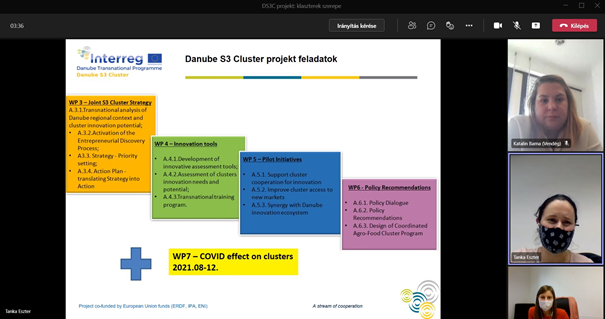Danube S3 Cluster - Joint Analysis of the impact of the COVID-19 pandemic on the agro-food sector in the Danube region
20-12-2021
Mapping WP7
As a follow up on the transnational analysis of the regional context and cluster innovation potential in the Danube region that was conducted within the Danube S3 Cluster project, the project partners under the lead of Steinbeis Europa Zentrum developed a mapping of the impacts of the COVID-19 pandemics on the agri-food sector in the partner countries in general and on clusters in this field, specifically.
To this end, 9 regional analysis were made, based on desk research, structured personal, telephone or video conference interviews and over 200 questionnaires sent out to stakeholders to conduct a PESTEL analysis. The PESTEL analysis (PESTEL stands for Political, Economic, Social, Technological, Environmental and Legal factors) is an environmental analysis to identify internal and external factors which can affect the performance of an organization positively or negatively. It is hence a suitable strategic tool to analyse the impacts of the Covid19 pandemic on the agri-food sector. The PESTEL analysis considers the “big picture”, that can influence a decision, a market or in this case, the agri-food sector. It provides the framework and methodology to analyse those macro-environmental factors, that, dependant of the capacity to respond or react to them, impacts the performance of a cluster or cluster member in the agri-food sector. This can lead to better understanding and hence better strategic choices.

Although all partner countries have seen at least some amount of political support and mitigation measures for the negative effects of the pandemic on the economy in general and/or the agri-food sector especially, there are indications that the COVID19 pandemic will have a lasting effect on the sector. On the positive side, in all fields of the analysis there could be found both negative and positive effects. These strengths or opportunities identified should be used in order to mitigate the damage and be able to recover and get back on track. Like that, the catalytic effect of the pandemic, especially regarding digitalization and the increased awareness for and importance of the local production of high-quality environmentally responsible agri-food products and services can be fully utilized for future benefits for the sector. This will be reflected in additional policy recommendations related to the covid19 pandemic and its impacts that will be developed on the basis on the analysis.
